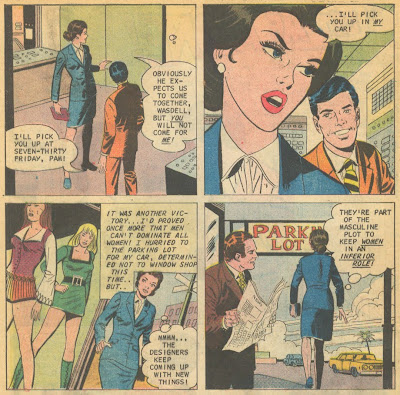
First, let's start out with the Charlton story, "Let Me Alone!" from Love and Romance #4 (February 1972). Charlton's output of stories concerning the Women's Movement has varied in tone with some stories on the more sensitive side à la "A Strange Good-Bye" and some like "I Hate You, Darling" with openly hostile characters. "Let Me Alone!" is definitely a story which makes a statement on the Women's Movement. But what sort of statement? Keep reading to find out!

Pam Burney is a successful executive computer analyst who isn't about to let any man get in the way of proving her worth to the company -- especially co-worker Glen Wasdell.

When invited to a party hosted by their boss, Pam tells Glen she will pick him up and not the other way around. While on her way to her car, Pam can't help but sneak a peek at the latest of fashions in a nearby shop window.

Pam passes that evening on new duds and admits that in public, she works hard to maintain her "image as a career woman." We as readers, however, are privy to Pam's dreams in which she and Glen carry on a romance. In real life, Pam ditches the provocative clothing of her dreams and wears instead to the party a sensible white blouse and knee-length skirt. During the evenings festivities, their boss compliments Pam and Glen both, saying that they are his two best young analysts. Instead of taking the compliment, Pam says to her boss, "If you expect me to swoon over being called 'as good as' Glen Wasdell, you'll be disappointed." Their boss takes Pam aside to let her know that it is not her sex, but her poor attitude towards her coworkers that will prevent her from reaching the top.

In a strange turn that seems typically Charlton, Pam removes her "Femme Lib outfit" to reveal a sexy romper underneath. Apparently, Pam takes the recommendation from her boss to be nicer as a cue to lose her convictions and appeal to the desires of her male co-worker. The end of the story has Pam declaring that her "preoccupation with Women's Lib" has ended and that she has surrendered.

Linda and Dave meet at a party, are instantly smitten with one another, and spend the whole night dancing and laughing.

Dave already knew an important tidbit about Linda from their hostess -- she was soon leaving for the Peace Corps in Africa. He mentions that he is also leaving -- to go to medical school in Europe. They agree to just have fun during the time they do have, but the dates on the calendar loom over them.

The weeks wear on and suddenly, September arrives and their parting is imminent. Having fallen in love with Dave, Linda is completely devastated. Dave loves Linda too, but reminds her that they must be true to their dreams and commitments.

Agreeing that they both must follow their individual paths, they decide to part with only fond memories of their brief time together. In her heart, Linda is hopeful that the future will bring a reunification.
Our final story for the month is "Give Me Liberty or Give Me Love!" from Young Love #92 (February 1972).

The title is actually misleading as it implies a choice to be made. Read on to find why that is not necessarily the case for our leading lady!

As Janis and Perry make their way to the boathouse late one evening, Perry slips up and accidentally in affection, calls his girlfriend "baby." Janis, who never lets a man carry her lunch tray or open doors for her, is furious and accuses him of being a typical chauvinist male.

But we see that Perry isn't all that bad -- on a following day he and Janis attend their Women's Lib group meeting to prepare for a demonstration to be held at a football game. Perry helps by distributing literature. At the demonstration, Janis isn't fazed by the nasty looks and jeers she receives from people who aren't on board with the Women's Movement. While standing her ground, Janis is trampled by a group of giddy young ladies with hopes of touching a football player. Suddenly in the confusion, a gorgeous football player scoops her up, saving her from further injury. He carries her to the team doctor who tapes up her twisted ankle.

Just as Janis begins to welcome the football player's chivalry, he tells her that "Things like picketing -- job security...civil rights -- they're strictly men's problems." Understandably horrified, Janis demands to be let out of the cab and lets her companion know that he is one of the creeps inhibiting the progress of women.

Already feeling bad about her susceptibility to the affection displayed by the football player, Janis is confronted by her Women's Lib group -- primarily the leader -- strict, glasses-wearing Harriet. The two get into it, and Harriet reprimands Janis for falling prey to the male ego. Janis tells Harriet that she is a dictator and asserts that femininity and equality can make for apt bedfellows.

Janis quits the group, vowing to find another that supports her viewpoints. In the meantime, it is Perry who stands by Janis's side as both boyfriend and ally.
From today's viewpoint, Charlton's take on the Women's Movement is nutty to say the least, but stands as a testament to the various opinions of the changes occurring in society. Marvel's take on the societal changes of the 1970s definitely is more palatable to the reader of today, and one that in my opinion is more romantic -- but still implies that being feminist means abandoning love. I myself prefer the DC take -- one in which love and romance are compatible with equality and feminism.
It has been a discussion-filled month here at Sequential Crush and I would love to hear your thoughts on these three stories! As always, thanks for reading!



No comments:
Post a Comment